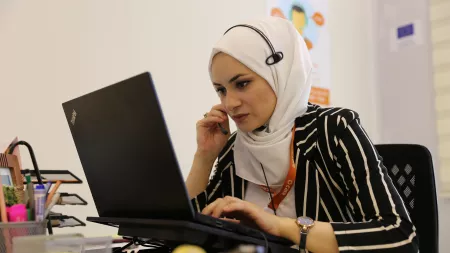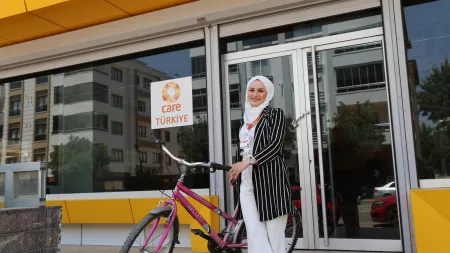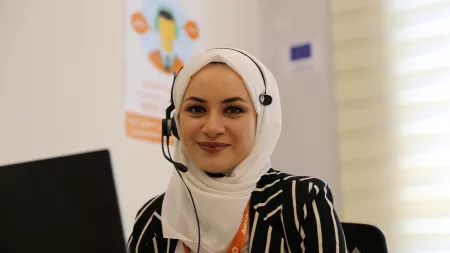Sabah never imagined that the war would force her to quit her job teaching music to children in Syria and become a refugee working in restaurants in Turkey. “I was very frustrated, and I asked myself what happened. I felt that life had stopped, or that the world would end soon.”, Sabah says.
Vowing not to give up, Sabah regained her balance. She benefited from her native Arabic and Turkish language skills, and managed to obtain a sworn translator's certificate. As a first step, she began teaching Turkish to Syrian refugees. With the spread of the Covid pandemic in 2020, CARE in Turkey, with the support of the European Union launched a helpline service, where refugees could call for help and inquire about available services. Since Sabah loves to work with people and help them, she applied for the job and became one of the first employees in CARE's helpline service. She provides translation for callers and supports them to communicate with officials in the governmental departments.

Most of those who call live in difficult financial circumstances and their income barely covers their basic needs. Often, they cannot afford to hire an interpreter to accompany them when they are accessing available services. Sabah also provides information of interest to refugees and directs them to where they can obtain appropriate legal, health, and protection services. She also links people who need assistance with other programs offered by CARE Turkey or other humanitarian organizations such as the Women Economic Empowerment program. This program enables women to generate incomes to support their families.
Through this work, helping others, communicating with them and guiding them, I feel that I am helping them change their lives for the better. Getting close to these people’s lives makes me feel part of it and gives me more meaning in my lifeSabah, helpline operator working at CARE Turkey
Sabah is a working mother and her daily schedule is full. Her 7-year-old daughter, Jana, and a 9-month-old baby, Jasoor keep her busy. Every day the family wakes up at 7 am to meet both her personal as well as professional responsibilities. “By 8:30 am, I make coffee, and review my work and plans for the day. And when the working hours start, I'm all ready to receive calls," she says.
Calls start coming in at 9 am. Sabah stays on the line with callers as long as they need help. “One time, I spent 80 minutes continuously translating for a male refugee in a hospital so he could get the health service he needed,” Sabah says. During the day Sabah cycles her bike three times to the nearby kindergarten to nurse her little son. Riding her bicycle also represents a sense of accomplishment for Sabah. At 17:00, Sabah stops receiving calls and reviews her work with the team. After a full day, she is ready to return to her home, husband and children.

Sabah recalls that time when she received a call from a refugee woman who was subject to violence by her addicted husband. “He forced her out of the house. She did not have any relatives in Turkey and did not know where to go. The woman had saved the CARE helpline number on her phone and contacted us. I tried to calm her down and connected her with the case management team that secured a shelter for her to stay in. After that, the legal team supported her with the legal advice she needed. She decided to file a divorce against her husband. The Women’s Economic Empowerment Team also provided her with a micro-credit loan to start her own business to generate income. The woman called us after a while and expressed her gratitude, and told us that she started her own business and is now financially independent. She still calls us whenever she needs any translation service, like booking an appointment at a hospital. When I think of this lady, how her situation was and how she is today, I feel happy that we helped her to change her life for the better” says Sabah.
Sabah hopes that she will be able to leave a mark in the world. She told us about her aspirations for the future. "I want to be satisfied with what I am doing during my life. I hope to leave a mark that will remain even after I'm gone, whether in the community or in the lives of people I help. I want my children to be happy and successful. It is not important that they become doctors or engineers. What is important is that they will be successful in whatever they do. I also hope that safety and peace will return to my country, Syria."
